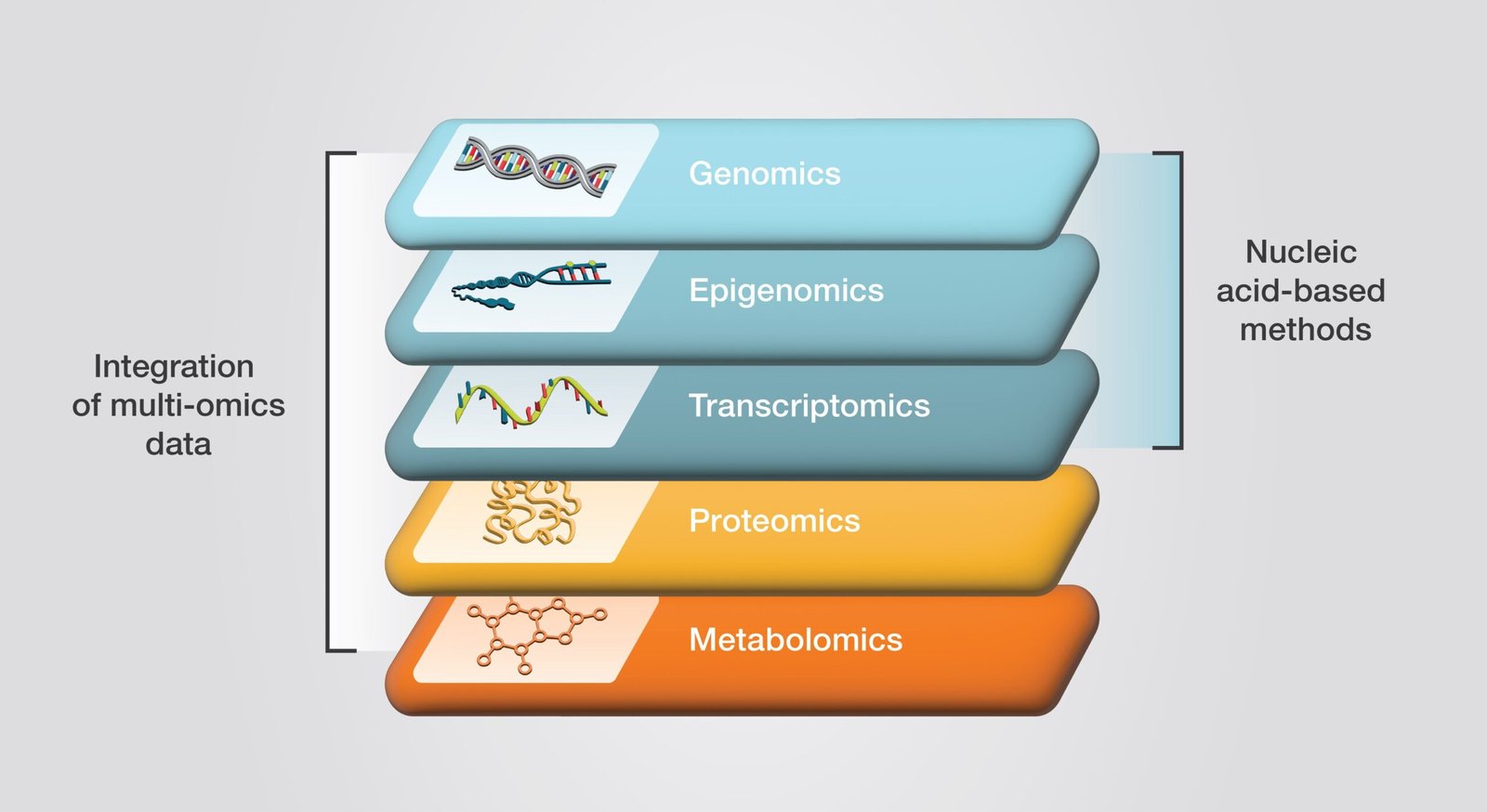The term “omics” refers to a burgeoning field in biology that involves the comprehensive study of entire sets of biological molecules within an organism. These disciplines, often ending in “-omics,” have revolutionized our understanding of biological systems by providing a holistic view of cellular processes and their interplay. This article will delve into the key “omics” fields, their significance, and their transformative impact on various aspects of human life.
Genomics: The Blueprint of Life
Genomics focuses on the study of an organism’s entire genome, the complete set of DNA, including all of its genes. This field has been at the forefront of the “omics” revolution, driven by advancements in DNA sequencing technologies.
Key Applications
Personalized Medicine: Genomics plays a crucial role in personalized medicine, enabling the identification of genetic predispositions to diseases, tailoring treatments based on individual genetic makeup, and developing targeted therapies.
Disease Diagnosis and Treatment: Genomic analysis aids in the diagnosis of genetic disorders, identifying disease-causing mutations, and guiding treatment strategies.
Drug Discovery: Genomics helps in identifying drug targets, predicting drug responses, and developing personalized medications.
Agriculture: Genomics is used to improve crop yields, enhance disease resistance, and develop genetically modified organisms (GMOs) with desired traits.
Transcriptomics: The Voice of the Genome
Transcriptomics investigates the complete set of RNA molecules (the transcriptome) produced by an organism.9 RNA molecules, particularly messenger RNA (mRNA), carry genetic information from DNA to ribosomes, where proteins are synthesized.
Key Applications
Gene Expression Analysis: Transcriptomics provides insights into which genes are actively being expressed in a cell or tissue at a particular time, revealing cellular responses to different stimuli, such as disease, stress, or environmental changes.
Disease Diagnosis and Prognosis: Changes in gene expression patterns can serve as biomarkers for various diseases, aiding in diagnosis, prognosis, and monitoring disease progression.
Drug Development: Transcriptomics helps identify genes involved in disease processes, providing potential drug targets and aiding in the development of new therapies.
Proteomics: The Functional Players
Proteomics focuses on the study of the entire set of proteins (the proteome) produced by an organism. Proteins are the workhorses of the cell, carrying out a wide range of functions, from catalyzing biochemical reactions to providing structural support.
Key Applications
Disease Diagnosis and Prognosis: Protein levels and modifications can serve as biomarkers for various diseases, enabling early detection and monitoring of disease progression.
Drug Discovery: Proteomics helps identify protein targets for drug development, understand drug-protein interactions, and predict potential side effects.
Biomarker Development: Identifying protein biomarkers can aid in early disease detection, risk assessment, and monitoring treatment response.

Metabolomics: The Chemical Fingerprint
Metabolomics investigates the complete set of small molecules (metabolites) within a cell, tissue, or organism. Metabolites are the end products of cellular metabolism and reflect the physiological state of an organism.
Key Applications
Disease Diagnosis and Prognosis: Metabolic profiles can distinguish between healthy and diseased states, providing valuable insights into disease mechanisms and enabling early detection and diagnosis.
Drug Discovery: Metabolomics helps understand the effects of drugs on cellular metabolism, identify potential drug targets, and assess drug efficacy and toxicity.
Personalized Nutrition: Metabolomics can be used to assess individual metabolic responses to different diets, enabling personalized nutrition recommendations.
Other Omics Fields
Epigenomics: Studies the chemical modifications of DNA and associated proteins that regulate gene expression without altering the underlying DNA sequence.
Microbiomics: Investigates the microbial communities that inhabit different environments, including the human body.
Glycomics: Focuses on the study of carbohydrates and their roles in biological processes.
Lipidomics: Investigates the lipidome, the entire set of lipids within an organism.
Interactomics: Studies the complex network of interactions between different biomolecules within a cell.
Systems Biology: Integrating the Omics
Systems biology aims to integrate data from multiple “omics” fields to gain a comprehensive understanding of biological systems. By analyzing the interactions between different biomolecules and cellular processes, systems biology provides a holistic view of how organisms function.
The Impact of Omics Technologies
The “omics” revolution has had a profound impact on various fields, including:
Healthcare: Improved disease diagnosis, personalized medicine, drug discovery, and development of novel therapies.
Agriculture: Increased crop yields, enhanced disease resistance, and development of more sustainable agricultural practices.
Environmental Science: Understanding the impact of environmental factors on ecosystems and developing strategies for environmental protection.
Biotechnology: Development of new biotechnologies, such as gene editing and synthetic biology.
Challenges and Future Directions
Despite the significant progress made in “omics” research, several challenges remain:
Data Analysis and Interpretation: Analyzing and interpreting the vast amounts of data generated by “omics” technologies requires sophisticated computational tools and expertise.
Integration of Data: Integrating data from multiple “omics” fields to gain a comprehensive understanding of biological systems remains a significant challenge.
Ethical Considerations: Addressing ethical concerns related to data privacy, genetic discrimination, and the responsible use of genetic information.
Final Thoughts
The “omics” revolution represents a paradigm shift in our understanding of biological systems. By providing a comprehensive view of the intricate network of molecules within an organism, these technologies are driving advancements in various fields, from personalized medicine and drug discovery to agriculture and environmental science.
However, the rapid growth of “omics” data also presents significant challenges, such as the need for sophisticated data analysis tools, the integration of data from multiple “omics” fields, and the responsible consideration of ethical implications.
FAQs
What does “omics” mean?
“Omics” refers to the study of entire sets of biological molecules within an organism. These fields, often ending in “-omics” (like genomics, transcriptomics, proteomics), provide a comprehensive view of how biological systems function by analyzing all the components of a particular class of molecules.
Can you explain some key “omics” fields in more detail?
Genomics studies an organism’s entire genome (DNA), providing insights into genetic variations and disease predispositions. Transcriptomics investigates all RNA molecules produced by an organism, revealing which genes are actively expressed. Proteomics focuses on the study of all proteins, crucial for various cellular functions. Metabolomics investigates all small molecules within an organism, reflecting its physiological state.
How are “omics” technologies impacting healthcare?
“Omics” are revolutionizing healthcare. They enable personalized medicine by tailoring treatments to individual genetic makeup, aid in disease diagnosis by identifying biomarkers, and accelerate drug discovery by understanding disease mechanisms and identifying potential drug targets.
To read more, Click Here




Leave a Reply